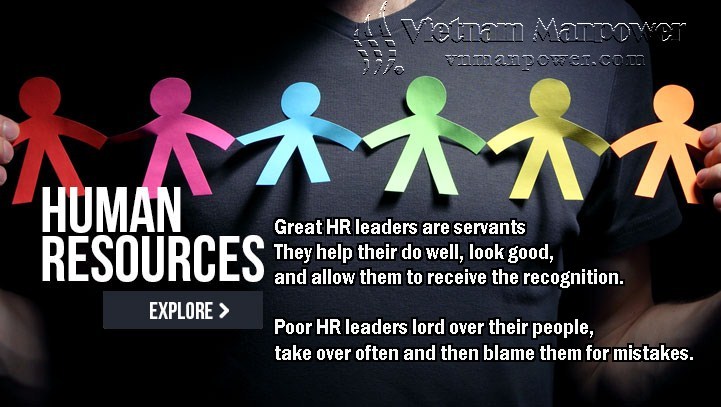Widely known, HR factor is crucially important to organizational success. Still, it doesn’t make clear how HR managers can effectively tackle people issues. All efforts many managers have put in often don’t succeed in bringing out the best in their employees. 5 habits that may stand in the way that HR managers are successful in their employee management are: defect fixation, imitation neurosis, , , individual obsession, supervision addition and elite glorification. They all have the good and the bad in it. And those habits will become the ugly if the manager develops the bad sides of theirs. But if they know how to supplement the bad and make best use of the good, they will be much more successful in their career as HR management.
The Bad

1. Defect fixation
When facing problems, many managers tend to look for mistakes, deficiencies and employees at fault. Gallup research (Buckingham & Clifton, 2001) has shown how negatively focused most managers are. For example, personnel selection is being carried out as a process of risk detection (what risk do they take if they recruit this applicant?); in appraisal conversations, managers mainly focus on what is wrong with the person and his work performance. Defect fixation often has the following disadvantages:
• It seems that more and more causes are found.
• Resistance rises
• Problems grow in an unsuspected way
Helpful information for those who are interested in:
The scientific study of candidate assessment

2. Imitation neurosis
Managers tend to follow management trends (also, hypes) – for example, core competencies, self-managing teams, competency management, coaching, etc. According to Willem Mastenbroek – a Dutch professor of change management (1997), “approximately 75% of the initiatives turns out to be a fiasco. But never mind, the next paradigm jump is already presenting itself.”
3. Individual obsession
Lots of managers consider the organization as a collection of individuals rather than a complex system. This tends to overestimate the significance of personal attributes and underestimate the situational factors. It works through in such things as strictly individual-focused selection processes, individual target setting, individual performance appraisal and rewards, headcount approaches to personnel, personal development programs. The individual obsession induces unproductive competition between fellow workers, and a humble investment in cooperative relationships and in the work systems.
For those who are interested in:
How well are you doing values-based employee recognition program?
4. Supervision addition
Many managers are inclined to supervise and check workers too much. Many workers have told that they are getting more autonomy and freedom decision though, they feel disappointed when their managers indeed keeps on controlling and overruling them. A study by Cialdini et al (1997) demonstrates that managers have hard time letting go. They interpret this with the so-called faith in supervision effect. Specifically, both managers and staff have an unjustified strong faith in the supervision value. The supervision addition often results in skeptism about the rhetoric of empowerment and delegation. Also, the work quality and the commitment to work and organization negatively result from the experienced lack of autonomy.
You may also like reading:
What kinds of managers are making their staffs annoyed?
Common misunderstandings of employers
Why employees don't trust their boss?
5. Elite glorification
There are managers who invest one-sidedly and excessively in top potentials. The elite glorification is related to the fundamental attribution error (also, individual obsession). This can induce excessive pay for top managers, unbalanced high-potential policies (indulging and promoting them too quickly). The excessive attention to the top performers of the organization, in fact, degrades most of the employees. Ironically, according to research by Collins (2001), the best top managers really are tenacious, modest and quite unknown.
The good

Would it be better if the managers would give up those habits altogether? Indeed, all those habit have the good sides, too.
1. Defect fixation
What is good about defect fixation is that managers acknowledge what isn’t right. They are aware of risks and threats. Without this, the company would slip into the state of groundless positivism.
2. Imitation neurosis
The good side of imitation neurosis is that the managers are open for external knowledge as well as innovation. It means the willingness to learn from the outside world. Without this, companies would become inflexible and self-satisfied.
In case you are interested in:
When to use in-house training for your employees?
3. Individual obsession
The cons of individual obsession are that the significance of human factor is recognized, and individual needs and contributions are valued. Without this, there would be the dictatorship of the collective.

4. Supervision addiction
Supervision addition has good sides in it, too. It implies the willingness to lead and shoulder responsibility, which gives clarity and direction. Without direction and correction, the company could turn into chaos or disintegrate.
In case you want to have a look at:
How to develop leadership skills
5. Elite glorification
The good side of elite glorification is that differences in personal performance and talents are acknowledged. Without such an acknowledgment, the dictatorship of mediocrity may reign.
For your information:
Talent mobility: the future of labor market
How to identify talents through CVs
Talented candidates are everywhere, the question is how to find them?
What complementary habits are required?
As those habits are not just bad but have good sides, too, they don’t have to be eliminated. Still, they are being handled too one-sidedly; that’s why there require complementary habits:
1. Defect fixation and attention to problems and successes
Gain energy for change, using problem acknowledgment. Then proceed with success focus by demonstrating what success would look like to you, analyzing how you have in the past for being able to create this kind of success, and extending and recreating that success.
2. Imitation neurosis and attention to external and internal knowledge
Give first priority to learning from the own experiences (solutions already proven about their value in the relevant context). Also, be open for external solutions, but evaluate systematically how they are helpful or can be made helpful in your context.

3. Individual obsession and attention to individuals and organizational system
Continue acknowledging individual achievements and needs, but don’t overly do it. Also, recognize the great importance of interaction and cooperation between people. Not all, recognize the considerable importance of the operating system – for example, organizational structures, computer systems, planning systems, procedures, etc.
See also:
Techniques to Help Increase the Communication Between Your Employees
4. Supervision addiction and attention to directing and giving autonomy
Continue leading, directing, supervising, checking and correcting, though, it should just be done on a small set of essential issues. Don’t turn on the too controlling mode.

5. Elite glorification and attention to top potentials and to all others
Recognize and avail differences in talents, meanwhile develop the talents of all employees. Create symbolic egalitarianism. As per research by Pfeffer (1996), focusing attention on differences in status (very prestigious rooms and cars, very large pay differences, etc.) can impede the organizational success.
Wrap up
Those HR management habits block success but appear to have good sides in them, too. Managers having those habits don’t have to change radically. Instead, they can hold on to the good sides of the habits and supplement the bad sides with some complementary habits. A drastic change isn’t needed.












Replies to This Discussion